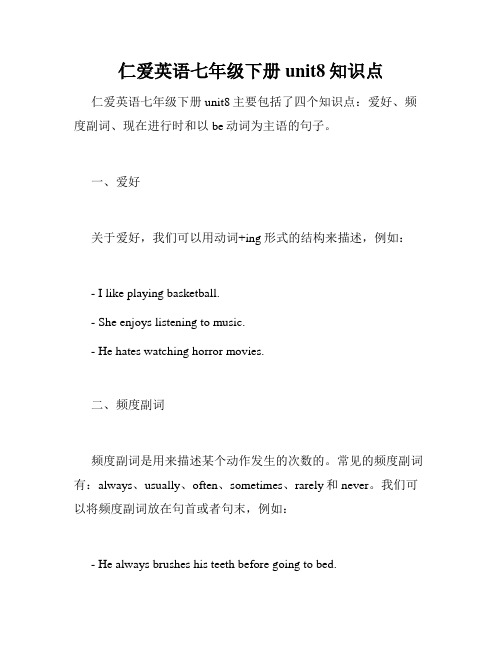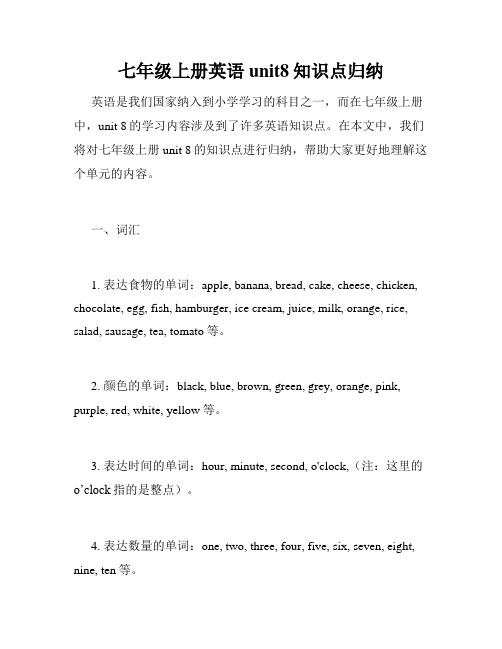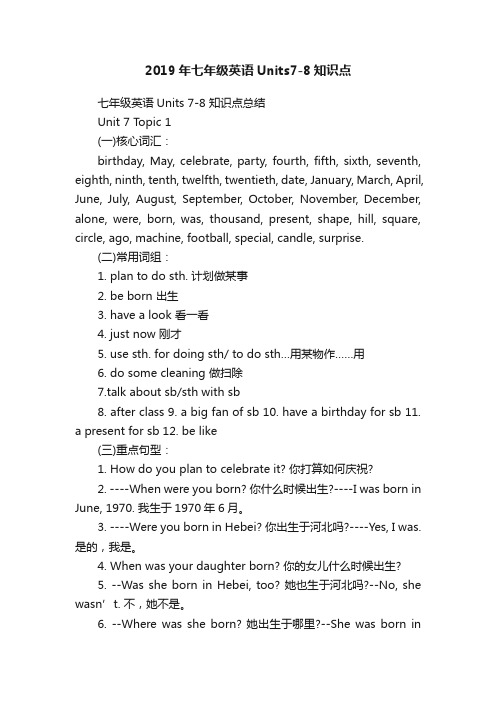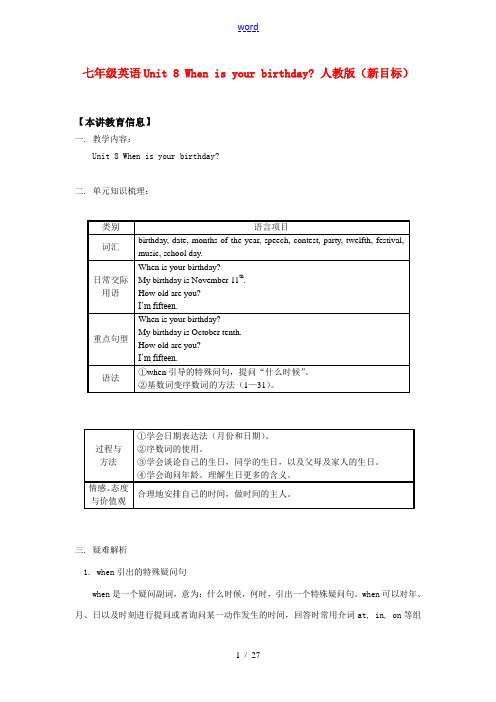七年级英语第七八单元知识点归纳
牛津译林版英语七年级上册分单元知识点归纳总结(Unit1-8))

牛津译林版英语七年级上册全册知识点归纳总结(最新)Unit one一、词汇知识点整理:look after \ take care of 照顾;表示look 的短语:look after照顾look at 看…;look for 寻找look like 看起来像…on the first day 在第一天Class One, Grade Seven (先说班级,再说年级,且大写)。
play football 踢足球after school 放学后be\come from 来自be good at \do well in 擅长fly kites 放风筝go home 回家listen to music 听音乐play a game 玩游戏wear glasses 戴眼镜at school 在学校all the lessons 所有的课程talk about 谈论over there 那里 a lot of hobbies 许多爱好二、结构用法:love\like doing sth 喜欢做某事let’s +动词原形让我们I am\My name is 我叫welcome to +地点欢迎来到This is 这是be good at \do well in doing 擅长做in Class…Grade…在几年级几班be from = come from + 地点, 意思是“来自某地”。
He is from Nanjing. P8 他来自南京。
live with…in…和谁住在哪里live with sb 和某人住一起;live in+ 城市名,住在某地;live on the ground floor 住在一楼(用介词on)I’m …year old. 我几岁了。
year(s) old ,……岁,如果数词大于1,year 要用复数years. 问年龄要用How old “几岁”提问。
例如:- is your sister? --- She is 11. 应填How old.I have (short/long)hair.我留着短(长)头发三、句式用法What’s your name?你叫什么名字?Nice to meet you! 很高兴见到你。
七年级英语第七八单元知识点归纳

1.teach sb to do sth.:教某人做某事2. play basketball打篮球play ping-pong打乒乓球play football踢足球3. learn to do:学做某事4.be ready for sth/be ready to do sth:准备好做某事5.like to do sth :喜欢做某事(偶然性)like doing sth:喜欢做某事(指个人习惯)6.be called:被叫做...7.cheer for:为...欢呼8.在比分中表示几比几用“to”,如:3:4读作:three to four9.be good for:对....有益,对……有好处;be bad for对……害,对……坏处10. How often:对频率进行提问表示次数:一次用once,两次用twice,三次以上:数字+times,如三次three times一周一次:once a week 一个月两次:twice a month一年五次:five times a year11. need:需要(实义动词或行为动词)need to do:需要做...12. It takes sb sometime to do sth:做某事花费某人多少时间13. for example:例如(通常放在句首)14. a helpful person:一个有益的人(person复数形式persons)15.现在分词put-putting/ run-running /shop -shopping/hit-hitting /sit-sitting /swim —swimming16. look+形容词:看起来……17. go+动词ing形式(即动名词):去做某事go swimming去游泳go shopping去购物go fishing去钓鱼go skating去滑冰go skiing去滑雪18. easy(形容词)-easily(副词)happy(形容词)- happily(副词)heavy(形容词) - heavily19. watch a basketball game观看一场篮球比赛20. against (介词)反对,违反:The tigers played against the lions.老虎队对战狮子队。
仁爱英语七年级下册unit8知识点

仁爱英语七年级下册unit8知识点仁爱英语七年级下册unit8主要包括了四个知识点:爱好、频度副词、现在进行时和以be动词为主语的句子。
一、爱好关于爱好,我们可以用动词+ing形式的结构来描述,例如:- I like playing basketball.- She enjoys listening to music.- He hates watching horror movies.二、频度副词频度副词是用来描述某个动作发生的次数的。
常见的频度副词有:always、usually、often、sometimes、rarely和never。
我们可以将频度副词放在句首或者句末,例如:- He always brushes his teeth before going to bed.- I usually eat breakfast at 7 o'clock in the morning.- They sometimes go to the park on weekends.- She rarely drinks coffee because it makes her nervous.- We never miss our English class.三、现在进行时现在进行时用来描述正在进行的动作,其结构为:be动词+现在分词。
例如:- He is playing basketball with his friends now.- They are watching TV in the living room.- She is studying English at the library.- We are listening to music in the classroom.需要注意的是,某些动词不宜用于现在进行时,例如感官动词(see、hear、smell、notice、feel、taste)和状态动词(be、seem、appear、look、feel、sound、taste)。
七年级上册英语七八单元知识点总结

七年级上册英语七八单元知识点总结一、七年级上册英语七八单元的重点单词1. school2. library3. cafeteria4. playground5. gym6. science7. math8. art9. music10. geography二、七年级上册英语七八单元的重点短语1. go to school2. have lunch3. play basketball4. do homework5. listen to music6. draw pictures7. study English8. read books9. write an em本人l10. sing a song三、七年级上册英语七八单元的重点语法1. 一般现在时例句:I go to school every day.2. 一般过去时例句:I played basketball yesterday.3. 一般将来时例句:I will do my homework tomorrow.4. 介词in,on,at的用法例句:I have art class on Mondays.5. 形容词的比较级和最高级例句:I am taller than my brother.6. be动词的用法例句:She is a science teacher.四、七年级上册英语七八单元的重点句型1. What do you do on weekends?答句:I play basketball on weekends.2. What does she like?答句:She likes music.3. How often do you study English?答句:I study English every day.4. Where is the library?答句:The library is next to the cafeteria.5. When does the art class start?答句:The art class starts at 2 o'clock.五、七年级上册英语七八单元的重点阅读材料1. My School介绍学校的情况,包括教室、图书馆、操场等地方。
七年级上册英语unit8知识点归纳

七年级上册英语unit8知识点归纳英语是我们国家纳入到小学学习的科目之一,而在七年级上册中,unit 8的学习内容涉及到了许多英语知识点。
在本文中,我们将对七年级上册unit 8的知识点进行归纳,帮助大家更好地理解这个单元的内容。
一、词汇1. 表达食物的单词:apple, banana, bread, cake, cheese, chicken, chocolate, egg, fish, hamburger, ice cream, juice, milk, orange, rice, salad, sausage, tea, tomato等。
2. 颜色的单词:black, blue, brown, green, grey, orange, pink, purple, red, white, yellow等。
3. 表达时间的单词:hour, minute, second, o'clock,(注:这里的o’clock指的是整点)。
4. 表达数量的单词:one, two, three, four, five, six, seven, eight, nine, ten等。
二、语法知识1. there be句型:表示“某地存在某物”,例如There is a pen on the table.意为“桌子上有一支笔”。
2. 简单的介词短语:指使用介词来表示两个词之间的关系。
例如:in the morning(在早上)、at night(在晚上)等。
3. 一般现在时:常用来表达日常习惯或经常发生的事情。
例如:I eat breakfast at 7:30 every morning.(我每天早上7点半吃早餐)4. 比较级的用法:用于比较两个事物的程度,添加-er或者more,例如:cat > smaller > smaller than(小猫),dog > stronger > stronger than(大狗)。
2019年七年级英语Units7-8知识点

2019年七年级英语Units7-8知识点七年级英语Units 7-8 知识点总结Unit 7 Topic 1(一)核心词汇:birthday, May, celebrate, party, fourth, fifth, sixth, seventh, eighth, ninth, tenth, twelfth, twentieth, date, January, March, April, June, July, August, September, October, November, December, alone, were, born, was, thousand, present, shape, hill, square, circle, ago, machine, football, special, candle, surprise.(二)常用词组:1. plan to do sth. 计划做某事2. be born 出生3. have a look 看一看4. just now 刚才5. use sth. for doing sth/ to do sth…用某物作……用6. do some cleaning 做扫除7.talk about sb/sth with sb8. after class 9. a big fan of sb 10. have a birthday for sb 11.a present for sb 12. be like(三)重点句型:1. How do you plan to celebrate it? 你打算如何庆祝?2. ----When were you born? 你什么时候出生?----I was born in June, 1970. 我生于1970年6月。
3. ----Were you born in Hebei? 你出生于河北吗?----Yes, I was. 是的,我是。
人教版七年级英语下册第八单元知识点总结

Unit 8 Is there a post office near here?一.重点单词和短语post office邮局go straight沿着….直走police station警察局turn right=turn to the right向右拐pay phone投币式公用电话turn left=turn to the left向左转on the Fifth Avenue在第五大街go along=walk along=go down沿着……走across from在….对面on one’s left在某人的左边next to紧靠…on the right在右边between…and….在…和…之间at the first crossing 在第一个十字路口in front of在…前面welcome to…欢迎到…..in the neighborhood在附近a house with a beautiful garden一个带漂亮花园的near here在这附近enjoy reading 享受阅读take a walk=have a walk散步look like 看起来take a taxi乘出租车have a good trip旅途愉快the way to…去….的路上have fun玩到开心二.重点单词和短语1. There be句型(1)结构:There be+sb./sth.+地点表示“在某地有某人或某物”(there是引导词,没有词义;be是谓语动词;某人/物是主语,地点作状语,多为介词短语)E.g. There is a bank in the neighborhood.(2)There be句型的谓语动词be在人称和数上应以后面的第一个名词保持一致。
▲如果后面的名词是可数名词单数或不可数名词,谓语动词用is.E.g. There is some salad on the table.▲如果后面的名词是可数名词复数,谓语动词用are.E.g. There are some students in the classroom.▲如果There be句型中有多个名词,be动词通常与第一个名词保持人称和数的一致。
七年级英语Unit8Whenisyourbirthday人教版(新目标)知识精讲

七年级英语Unit 8 When is your birthday? 人教版(新目标)【本讲教育信息】一. 教学内容:Unit 8 When is your birthday?二. 单元知识梳理:三. 疑难解析1. when引出的特殊疑问句when是一个疑问副词,意为:什么时候,何时,引出一个特殊疑问句。
when可以对年、月、日以及时刻进行提问或者询问某一动作发生的时间,回答时常用介词at, in, on等组成的表时间的介词短语。
例如:—When is your birthday?你的生日是什么时候?—My birthday is / It’s July 16th.我的生日是七月十六日。
—When do you go to school every day?你每天什么时候去上学?—I go to school at 6:30 every day.我每天6:30上学。
—When will your parents e to see you?你父母什么时候来看你?—On Sunday.星期天。
另外,除了when之外,还可用what time就时间进行提问,what time更强调“几点”。
如:—What time is it? —It’s six o’clock.现在几点钟?六点钟。
2. What year were you born?你出生于哪一年?what year表示对年代提问,相当于疑问副词when,所以该句也可用when提问:When were you born?当然用what year提问强调是哪一年出生的。
be born出生。
当我们说某人出生于某时或某地时,总是用一般过去时,即was / were born, was是am, is的过去式,were是are的过去式。
例如:—Where were you born?你出生于哪儿?—I was born in Wuhan.我出生于某某。
—When was your sister born?你的妹妹是什么时候出生的?—She was born on March 11th, 1990.她出生于1990年3月11日。
- 1、下载文档前请自行甄别文档内容的完整性,平台不提供额外的编辑、内容补充、找答案等附加服务。
- 2、"仅部分预览"的文档,不可在线预览部分如存在完整性等问题,可反馈申请退款(可完整预览的文档不适用该条件!)。
- 3、如文档侵犯您的权益,请联系客服反馈,我们会尽快为您处理(人工客服工作时间:9:00-18:30)。
一、第七单元知识点:
1. 过去式的构成:动词的过去式通常是在词尾加上-ed,例如:play - played, walk - walked。
2. 不规则动词的过去式:有一些动词的过去式形式不规则,需要特别记忆,这些动词的过去式形式是独特的,例如:go - went, buy - bought。
3. 过去时间的表达:过去发生的动作和状态,通常使用过去式来表达,例如:I played soccer yesterday.(我昨天踢足球了。
)
5. 对过去经历的询问和回答:我们可以使用过去式的疑问句来询问过去的经历,回答过去的经历时,通常使用表示过去时间的副词,例如:Did you go to the park last weekend? Yes, I went to the park
last weekend.(你上周末去过公园吗?是的,我上周末去过公园。
)
6. 在口语中,一般过去时和过去时间的表达还可以使用“used to + 原形动词”的形式,表示过去的习惯或状态,例如:I used to play basketball when I was young.(我小时候经常打篮球。
)
二、第八单元知识点:
1. 表示未来时间的表达:未来时间通常使用一般将来时来表达,一般将来时使用助动词will加上动词原形,例如:I will go to the beach tomorrow.(我明天要去海滩。
)
2. 表示将来计划和打算的表达:我们可以使用“be going to + 动词原形”的形式表达将来的计划和打算,例如:I am going to study English next week.(我下周要学习英语。
)
3. 表示将来时间的副词:通常和一般将来时连用,例如:tomorrow (明天)、next week(下周)、in the future(在将来)等。
4. 对将来的询问和回答:我们可以使用一般将来时的疑问句来询问将来的计划和打算,回答时通常使用表示将来时间的副词,例如:Will you go shopping tomorrow? Yes, I will go shopping tomorrow.(你明天要去购物吗?是的,我明天要去购物。
)
以上就是七年级英语第七八单元的知识点归纳。
这些知识点包括了过去式的构成、不规则动词的过去式、过去时间的表达、表示过去频度的副词、对过去经历的询问和回答,以及表示未来时间的表达、表示将来计划和打算的表达、表示将来时间的副词、对将来的询问和回答等。
通过学习这些知识点,学生能够更好地理解和运用过去时和将来时的语法规则,提高英语口语和写作能力。
